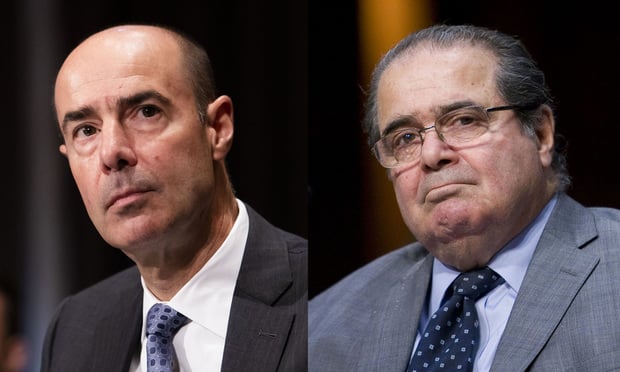Did Eugene Scalia Disavow His Father's Ruling on Homosexuality?
Antonin Scalia made it clear he disapproved of homosexuality. His son Eugene indicated he is fine with the normalization of LGBTQ culture.
September 20, 2019 at 06:04 PM
4 minute read
 Eugene Scalia, left, and Antonin Scalia, right.
Eugene Scalia, left, and Antonin Scalia, right.
The apple is falling farther from the tree.
As you probably know, Eugene Scalia, son of you-know-who and a big shot lawyer in his own right (he made over $6 million last year as a partner at Gibson, Dunn & Crutcher, for goodness sake!), has been nominated by President Donald Trump to be our next labor secretary.
He just sailed through his Senate confirmation hearings, but here's what caught my little ears: He was asked by Democrats about his views on firing gay or transgender employees. He gave the answer that you'd expect from any Big Law partner—that it's wrong. He testified: "I think that most of my clients had policies against that. Certainly, my firm did. It's something that would not have been tolerated by me or my firm or most of my clients."
Hit pause. Because this is coming from the mouth of the son of the late Antonin Scalia, who wrote that famous dissent in Lawrence v. Texas (the 2003 U.S. Supreme Court decision that struck down Texas' same-sex sodomy law) railing against the legal profession for promoting the "anti-antihomosexual culture."
In language that seems wildly antiquated now, Scalia wrote in the dissent: "Many Americans do not want persons who openly engage in homosexual conduct as partners in their business, as scoutmasters for their children, as teachers in their children's schools, or as boarders in their home."
Well, it looks like the father's fears have been realized. His own son seems fine with the normalization of LGBTQ culture. In fact, you might say the son just threw his father's legendary dissent into the dustbin. (Scalia declined to comment.)
 But Eugene wasn't always so cool. He admits his views have changed over the years, reports National Law Journal's Marcia Coyle on Law.com. Asked about a 1985 college article he authored in which he expressed disapproval of the gay lifestyle and his membership in an anti-LGBTQ group, Scalia told the Senate committee: "Yes, I certainly have changed in how I view any number of things since I was in college. I think we've all matured—one would hope—since those days. I would certainly enforce the law in this area and respect the decisions of the Supreme Court."
But Eugene wasn't always so cool. He admits his views have changed over the years, reports National Law Journal's Marcia Coyle on Law.com. Asked about a 1985 college article he authored in which he expressed disapproval of the gay lifestyle and his membership in an anti-LGBTQ group, Scalia told the Senate committee: "Yes, I certainly have changed in how I view any number of things since I was in college. I think we've all matured—one would hope—since those days. I would certainly enforce the law in this area and respect the decisions of the Supreme Court."
To be clear, though, Eugene didn't say he'll go to the mat for LGBTQ rights in the workplace. He's too good a lawyer to be pinned down.
As Coyle reports, he "did not answer directly on whether Title VII of the Civil Rights Act of 1964 prohibits employers from discriminating against workers because of sexual orientation or transgender status." Instead, he told the committee: "We'll see what the court decides," alluding, probably, to the three upcoming U.S. Supreme Court cases involving LGBTQ workers.
That said, Scalia seems to have undergone a genuine transition. Disavowing that college article, he said: "I wouldn't write those words today. I now have friends and colleagues to whom they would cause pain. I would not want to do that."
Which raises this intriguing question: Did his father's position on gay rights also evolve over the years?
Of course, I have no idea where Antonin Scalia stood on these matters at the end of his life. Since he penned that dissent, there's been a sea change in the gay rights arena. Indeed, I have to believe that he too had meaningful interaction with LGBTQ colleagues, relatives or friends.
So let's be generous and assume he was capable of change. I'd like to think so.
Email: [email protected]
Twitter: @lawcareerist
This content has been archived. It is available through our partners, LexisNexis® and Bloomberg Law.
To view this content, please continue to their sites.
Not a Lexis Subscriber?
Subscribe Now
Not a Bloomberg Law Subscriber?
Subscribe Now
NOT FOR REPRINT
© 2025 ALM Global, LLC, All Rights Reserved. Request academic re-use from www.copyright.com. All other uses, submit a request to [email protected]. For more information visit Asset & Logo Licensing.
You Might Like
View All
Paul Hastings, Recruiting From Davis Polk, Adds Capital Markets Attorney
3 minute read
Kirkland Is Entering a New Market. Will Its Rates Get a Warm Welcome?
5 minute read

Goodwin Procter Relocates to Renewable-Powered Office in San Francisco’s Financial District
Trending Stories
- 1'Ridiculously Busy': Several Law Firms Position Themselves as Go-To Experts on Trump’s Executive Orders
- 2States Reach New $7.4B Opioid Deal With Purdue After SCOTUS Ruling
- 3$975,000 Settlement Reached After Fall on Sidewalk
- 4'Where Were the Lawyers?' Judge Blocks Trump's Birthright Citizenship Order
- 5Big Law Sidelined as Asian IPOs in New York Are Dominated by Small Cap Listings
Who Got The Work
J. Brugh Lower of Gibbons has entered an appearance for industrial equipment supplier Devco Corporation in a pending trademark infringement lawsuit. The suit, accusing the defendant of selling knock-off Graco products, was filed Dec. 18 in New Jersey District Court by Rivkin Radler on behalf of Graco Inc. and Graco Minnesota. The case, assigned to U.S. District Judge Zahid N. Quraishi, is 3:24-cv-11294, Graco Inc. et al v. Devco Corporation.
Who Got The Work
Rebecca Maller-Stein and Kent A. Yalowitz of Arnold & Porter Kaye Scholer have entered their appearances for Hanaco Venture Capital and its executives, Lior Prosor and David Frankel, in a pending securities lawsuit. The action, filed on Dec. 24 in New York Southern District Court by Zell, Aron & Co. on behalf of Goldeneye Advisors, accuses the defendants of negligently and fraudulently managing the plaintiff's $1 million investment. The case, assigned to U.S. District Judge Vernon S. Broderick, is 1:24-cv-09918, Goldeneye Advisors, LLC v. Hanaco Venture Capital, Ltd. et al.
Who Got The Work
Attorneys from A&O Shearman has stepped in as defense counsel for Toronto-Dominion Bank and other defendants in a pending securities class action. The suit, filed Dec. 11 in New York Southern District Court by Bleichmar Fonti & Auld, accuses the defendants of concealing the bank's 'pervasive' deficiencies in regards to its compliance with the Bank Secrecy Act and the quality of its anti-money laundering controls. The case, assigned to U.S. District Judge Arun Subramanian, is 1:24-cv-09445, Gonzalez v. The Toronto-Dominion Bank et al.
Who Got The Work
Crown Castle International, a Pennsylvania company providing shared communications infrastructure, has turned to Luke D. Wolf of Gordon Rees Scully Mansukhani to fend off a pending breach-of-contract lawsuit. The court action, filed Nov. 25 in Michigan Eastern District Court by Hooper Hathaway PC on behalf of The Town Residences LLC, accuses Crown Castle of failing to transfer approximately $30,000 in utility payments from T-Mobile in breach of a roof-top lease and assignment agreement. The case, assigned to U.S. District Judge Susan K. Declercq, is 2:24-cv-13131, The Town Residences LLC v. T-Mobile US, Inc. et al.
Who Got The Work
Wilfred P. Coronato and Daniel M. Schwartz of McCarter & English have stepped in as defense counsel to Electrolux Home Products Inc. in a pending product liability lawsuit. The court action, filed Nov. 26 in New York Eastern District Court by Poulos Lopiccolo PC and Nagel Rice LLP on behalf of David Stern, alleges that the defendant's refrigerators’ drawers and shelving repeatedly break and fall apart within months after purchase. The case, assigned to U.S. District Judge Joan M. Azrack, is 2:24-cv-08204, Stern v. Electrolux Home Products, Inc.
Featured Firms
Law Offices of Gary Martin Hays & Associates, P.C.
(470) 294-1674
Law Offices of Mark E. Salomone
(857) 444-6468
Smith & Hassler
(713) 739-1250










